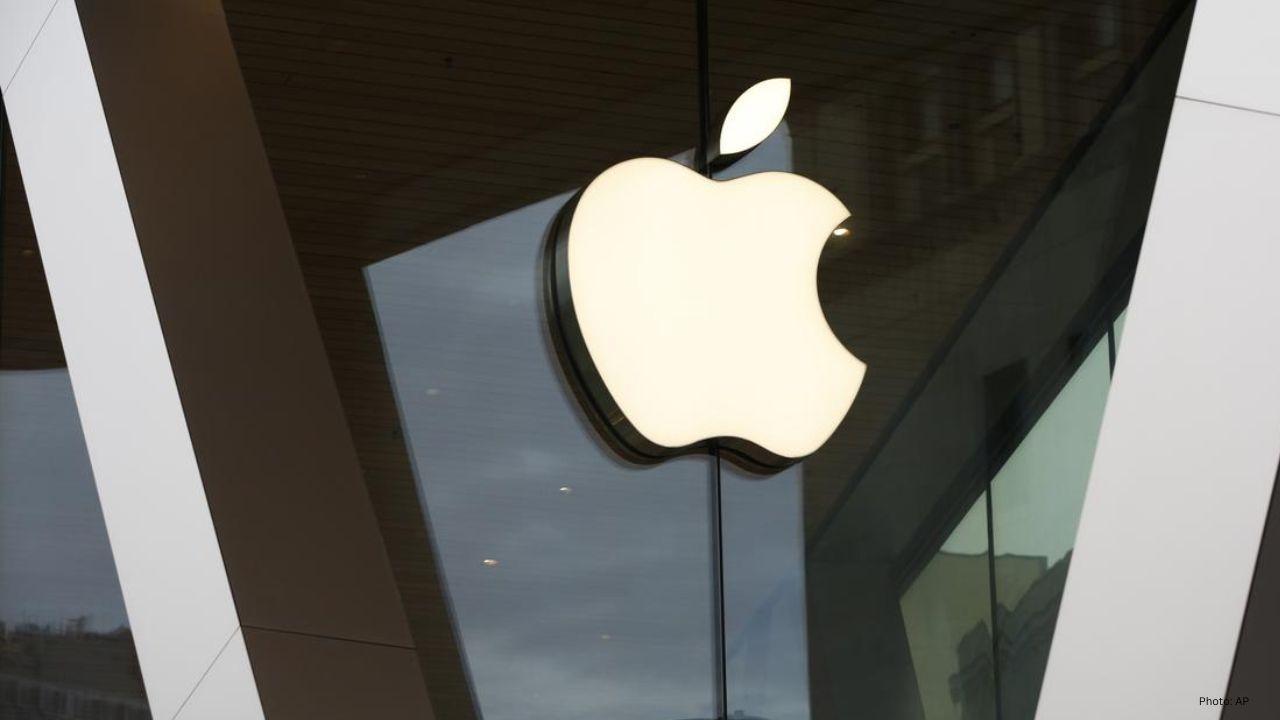
Join 10k+ people to get notified about new posts, news and tips.
Do not worry we don't spam!

Post by : Raman
Apple has once again captured global attention with its latest product launch and strategic moves in artificial intelligence. On September 9, at its widely anticipated “Awe Dropping” event, the company unveiled the iPhone 17 series, which includes four new models. Among them, the iPhone Air stood out as the thinnest iPhone ever, measuring just 5.6 millimeters. With a slim design, cutting-edge hardware, and promising AI integrations, Apple is signaling its intent to combine style, speed, and intelligence into a single device.
The iPhone Air is powered by Apple’s new A19 Pro chip and paired with the C1X modem. It features a 6.5-inch Super Retina XDR display with 120Hz ProMotion refresh rate, delivering bright, clear visuals with smooth motion for apps, videos, and games. Apple claims the phone can provide up to 27 hours of video playback on a single charge, and its fast charging capabilities can reach 50% battery life in just 30 minutes. On the camera front, the iPhone Air includes a 48-megapixel main camera and an 18-megapixel front camera, designed to offer high-quality photography and video calling experiences.
While hardware improvements are impressive, Apple’s AI strategy is garnering even more attention. OpenAI CEO Sam Altman expressed excitement over the iPhone Air before its launch. On X, he posted, “First new iPhone upgrade I have really wanted in a while! Looks very cool.” When asked if he was referring to the iPhone Air, he confirmed that he indeed meant the new slim iPhone. Altman’s enthusiasm highlights the significance of Apple’s integration of AI technology in its devices.
Apple has formed a strategic partnership with OpenAI, allowing it to enhance its Siri voice assistant using ChatGPT extensions. OpenAI is already a core part of Apple’s AI-driven features, providing technology that powers some of Apple Intelligence’s internal functions. While some enthusiasts have suggested completely replacing Siri with ChatGPT’s voice assistant, Apple has chosen a more cautious path. Instead, the company is developing “LLM Siri,” an advanced AI system that will make Siri more conversational and responsive while maintaining user privacy and security. This approach reflects Apple’s broader strategy of combining cutting-edge AI with its emphasis on device-level privacy.
The integration of AI into Apple devices is not just about convenience; it is about keeping pace with the rapidly growing AI sector. Competitors like Google, Microsoft, and Meta are aggressively expanding their AI capabilities. Google has developed Gemini AI, integrated into its apps and services, while Microsoft has embedded OpenAI’s technology into its cloud and software offerings. Meta is pursuing advanced AI research through its Superintelligence Labs. In this competitive environment, Apple has taken a measured approach, aiming to provide polished, reliable AI tools rather than rushing incomplete products to the market.
The iPhone Air represents this balance between innovation and caution. It delivers a sleek, lightweight design that appeals to users looking for a premium smartphone experience while incorporating hardware capable of supporting future AI advancements. By using the A19 Pro chip, Apple ensures that AI operations and data processing can occur efficiently on the device itself. This approach limits reliance on cloud-based computation, allowing Apple to maintain strong privacy protections, a cornerstone of the company’s brand promise.
Siri has long been Apple’s flagship AI product. Initially praised as an innovative voice assistant, it faced criticism for delays, limited functionality, and missed opportunities compared to competitors’ AI tools. With the introduction of ChatGPT extensions and the development of LLM Siri, Apple aims to revitalize this platform. The new AI assistant is expected to understand natural language better, provide more accurate answers, and integrate seamlessly with Apple’s ecosystem of apps and services. Users may soon see a Siri capable of carrying out more complex tasks, offering context-aware suggestions, and even interacting in a more conversational manner.
The iPhone Air’s launch also demonstrates Apple’s commitment to hardware design excellence. At 5.6 millimeters thick, the device is Apple’s slimmest smartphone ever, combining portability with high-end performance. The 6.5-inch display offers vibrant colors and sharp details, while the 120Hz refresh rate ensures smooth scrolling and fast response times. Battery longevity and fast charging capabilities further enhance the device’s appeal, making it suitable for heavy users who rely on their phones for work, entertainment, and communication.
On the software side, Apple Intelligence is a growing initiative aimed at embedding AI into various device functions. Beyond Siri, AI assists in predictive text, photo organization, app suggestions, and contextual recommendations, all designed to make the user experience seamless. By collaborating with OpenAI, Apple is expanding the potential of these AI capabilities, allowing for smarter, more adaptive features. This collaboration also positions Apple competitively in the AI race, ensuring it remains relevant as AI becomes a central aspect of consumer technology.
The iPhone Air is also notable for its camera capabilities. The 48-megapixel main camera delivers sharp, detailed photos even in low-light conditions. The 18-megapixel front camera provides quality selfies and video calls. Apple’s improvements to computational photography, combined with AI-driven image processing, mean that users can achieve professional-level photo quality without complex editing tools. AI integration further enhances features like scene recognition, portrait effects, and automatic adjustments to lighting and color, creating a smarter photography experience.
Apple’s careful approach to AI, emphasizing privacy and device-level processing, distinguishes it from competitors. Many AI-driven products rely heavily on cloud servers to process data, raising concerns about user privacy and security. Apple’s model allows for more processing on the device, reducing the need to share personal information externally. This approach ensures that users can enjoy advanced AI features without compromising privacy, an increasingly important factor in the digital age.
While Apple has been slower than some competitors in rolling out AI features, its approach aims to deliver quality and reliability. The iPhone Air, combined with LLM Siri and OpenAI-powered extensions, represents a significant step in this direction. Users can expect more intelligent assistants, faster responses, and deeper integration of AI into everyday smartphone functions. This measured rollout may help Apple avoid errors and mishaps that can occur when AI is deployed too quickly.
Apple’s partnership with OpenAI also signals a broader strategy for the company. By collaborating with one of the leaders in artificial intelligence, Apple gains access to cutting-edge AI research, models, and applications. This collaboration could accelerate the development of Apple Intelligence, improve Siri, and potentially introduce new AI-driven tools across Apple devices. The relationship may also allow Apple to experiment with AI features in a controlled, privacy-focused environment before releasing them to a global user base.
The iPhone Air has already generated excitement among users and tech experts alike. Its combination of sleek design, advanced hardware, and AI capabilities makes it one of the most appealing devices in Apple’s history. Early reviews and comments from industry leaders like Sam Altman suggest that Apple is successfully creating products that resonate with both regular users and professionals.
In addition to hardware and AI improvements, the iPhone Air supports Apple’s ecosystem strategy. Seamless integration with macOS, iPadOS, and watchOS ensures that users can experience AI across multiple devices. Features such as cross-device handoff, synchronized notifications, and AI-powered suggestions create a cohesive and convenient digital environment, further strengthening Apple’s market position.
Looking ahead, Apple faces several challenges. The company must continue to innovate in AI to remain competitive, while balancing privacy, device performance, and user experience. Leadership changes, product delays, and market competition have raised concerns about Apple’s pace in AI development. However, partnerships with companies like OpenAI and careful investment in hardware and software suggest that Apple is working strategically to meet these challenges.
the iPhone Air launch and the enhanced collaboration with OpenAI mark an important milestone for Apple. The combination of slim design, powerful hardware, and AI-powered software demonstrates Apple’s commitment to creating intelligent, user-friendly devices. By improving Siri with ChatGPT extensions and developing LLM Siri, Apple is positioning itself to compete effectively in the AI era, while maintaining its signature focus on privacy and quality.
The next year will be crucial to see how Apple expands AI features, enhances Siri, and integrates intelligence into its products. For now, the iPhone Air and Apple’s partnership with OpenAI have set a new standard for smart devices, combining elegance, power, and advanced technology in a way that is accessible and practical for millions of users worldwide.
iPhone Air, Apple iPhone 17, Sam Altman, OpenAI, ChatGPT Siri, Apple AI, iPhone Air review










Google Gemini Nano Banana Trend Lets You Create Realistic 3D Figurines
Turn your photo into a lifelike 3D figurine for free with Google Gemini’s Nano Banana trend. Fun, ea

Apple AI Leader Robby Walker Quits Amid Delays in Siri
Apple AI chief Robby Walker is leaving after a decade, raising concerns as Siri upgrades face delays

Phil Salt’s Record 141 Powers England to Big T20 Win
Phil Salt hit 141 not out as England smashed 304 runs to crush South Africa by 146 in the 2nd T20 at

India Dominates UAE by 9 Wickets in Asia Cup 2025 Opener with Brilliant Bowling
India dominates UAE in Asia Cup 2025 opener, winning by 9 wickets with Kuldeep Yadav shining and a q

Karishma's Kids Get 1,900 Crore: Priya Kapoor Defends Sunjay Kapur Estate
Priya Kapur claims Karisma Kapoor’s children already received Rs 1,900 crore as court battle over Su

Akshay Kumar 58th Birthday Heartfelt Thanks to Fans and Colleagues
Bollywood star Akshay Kumar celebrates his 58th birthday with gratitude, thanking fans and colleague